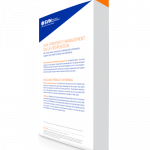Tenant Synergy in Retail Commercial Real Estate
With ICSC’s annual RECon upon us, it’s about time to talk about retail tenant synergy. The original logic behind the large anchored mall was that people were unlikely to go out of their way to go to an in-line store, like a pretzel shop or a shoe store, but that they were willing to travel to go to a department store, like a Macy’s or a JC Penney. To take advantage of this, commercial real estate developers began building malls that had department store anchors at their corners and lots of little “in-line” shops in between. The department stores frequently got discounted rent, so it was a win for them, and the in-line stores benefited from having lots of “forced” traffic as people going between the department stores walked by. While the model of the mall has changed over the years, the concept of a synergistic relationship between tenants continues.
 Looking for more examples? Have you ever noticed that most neighborhood centers have a card store right near the supermarket? Or, for that matter, have you ever wondered why neighborhood centers typically have take-out focused restaurants like Chinese or pizza shops near the supermarket? It’s all about convenience.
Looking for more examples? Have you ever noticed that most neighborhood centers have a card store right near the supermarket? Or, for that matter, have you ever wondered why neighborhood centers typically have take-out focused restaurants like Chinese or pizza shops near the supermarket? It’s all about convenience.
What is going on here is that these commercial real estate owners have realized the benefit of synergy. Having tenants that fit well together is not only a way to keep their customers happy, but it is also a way to keep tenants happy. A dry cleaner located next to a supermarket, a card shop, a pizza parlor, a family haircut place and a day spa is very unlikely to leave. They benefit not only from their proximity to the supermarket but also from their proximity to other supportive businesses which make that center a one-stop shop. What could be a better place for them?
Retail Tenant Synergy Gone Wrong
On the other hand, commercial real estate landlords who get desperate can sometimes fail to achieve synergy. While this can be a way to keep occupancies high in the short term, it can generate greater vacancy down the line. Here’s a real world example of four tenants at a center in an overbuilt but demographically desirable eastern suburb of St. Paul, Minnesota:
- High-end wine shop
- Yoga studio
- Gourmet food boutique focusing largely on cheese
- Army recruiting center
I know of another center in an inner-ring northern suburb that has the area’s largest gun shop, a tobacco store, a rowdy drinking establishment and a large health clinic. It doesn’t have a pharmacy.
Over time, these centers will typically lose the tenant that doesn’t fit or will lose more tenants as their outlier tenant changes the nature of the entire center. While few commercial real estate marketing packages talk about this and many commercial real estate investment brokers are unaware of it, achieving tenant synergy is crucial for a retail center to be successful in the long term.
At SVN, creating synergy is a fundamental part of the principles that underlie our Shared Value Network℠. To learn more about how we help retail owners create markets for their properties, join us on our SVN | Live ℠ Open Sales Meeting.
[bctt tweet=”Achieving tenant synergy is crucial for a retail center to be successful in the long term #CRE” username=”svnic”]
